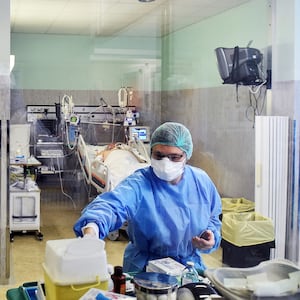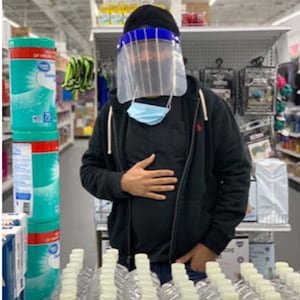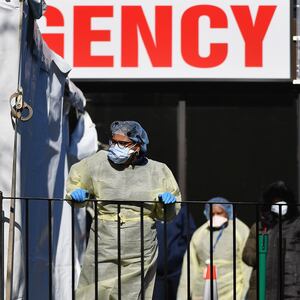Health-care workers say hospitals still aren’t providing them with adequate equipment to protect against the novel coronavirus, nearly six weeks after the pandemic was declared a national emergency. So they’ve started suing.
Nurses in New York filed suits against the state department of health and two hospitals this week, describing the facilities where they worked as a “war zone.” Three nurses in Alabama are suing a recruiting company for sending them into New York hospitals without adequate protective gear. And other providers are suing the Chinese government for allegedly blocking exports of masks and gloves to the United States.
“These lawsuits were filed to protect our nurses, our patients, and our communities from grossly inadequate and negligent protections,” said Pat Kane, the executive director of the New York State Nurses Association, of her group’s three suits. “We cannot allow these dangerous practices to continue.”
The lawsuits come as health-care workers across the country report mass shortages in personal protective equipment (PPE). Hundreds have described having to reuse single-issue masks and gowns, while others are resorting to wearing bandanas. Meanwhile, more than 9,000 health-care workers have tested positive for the coronavirus, according to the Centers for Disease Control and Prevention.
Recently, a colorful post has been circulating on Facebook, calling for nurses across the country to join a class-action lawsuit against their hospitals and clinics. The post claims these facilities “willfully disregarded” mandates to stock up on emergency supplies and put the lives of staff members at risk. “We will hold every CEO personally and publicly accountable for unsafe working environment[sic] and the deaths of their staff,” it reads.
The post is the brainchild of Laura Vonfrolio, a Staten Island nurse who’s been in the business for more than 50 years. (“I’m about to retire, so I’m going out with a bang,” she told The Daily Beast in a phone interview.)
Vonfrolio said she was inspired to organize the suit when she showed up for a nursing shift in early March and was given only a surgical mask as protection. When a supervisor told her she could not wear the N-95 she’d procured for herself, Vonfrolio says she walked out the door. But what bothered her most, she said, is that no one else followed her.
“The make-up of a nurse is someone who is kind, caring, and giving, and hospitals know that and they take advantage of it,” she said. “If nursing was primarily male, they’d never get away with it.”
The suit has yet to be filed, but Vonfrolio claims to have more than 1,000 nurses from almost every state in the country interested in joining the litigation.
Vonfrolio knows that such a suit would be an uphill battle—most class action suits are much narrower in scope—but said it would be enough just to draw attention to the issue.
“If anything, it will definitely empower nurses, or at least teach them that they need to band together,” she said. “Hopefully we’ll make TV and let people know what's going on in the hospitals.”
Meanwhile, the New York Nurses Association has filed complaints against the New York State Department of Health and Westchester Medical Center, along with a federal complaint against Montefiore Medical Center. In a press release, the group said nurses “have not received appropriate masks and carry out assignments in unsafe working conditions.”
Among other things, the suit claims Westchester Medical Center rationed gowns and N-95 masks, failed to instruct employees on how to properly use them, and retaliated against those who complained. At Montefiore, nurses claim they were forced to reuse N-95 masks for multiple days and were not provided testing on demand.
In a statement, a Westchester Medical Center spokesperson said the claims were “wrong,” and called the suit itself a “distraction from this work.” Montefiore Medical Center accused the nurses’ association of choosing to “attack a system, and the commitment of thousands of their colleagues, who have followed the Governor’s emergency orders and are selflessly doing all they can to fight COVID-19 and save lives.”
A spokesperson for the state health department declined to comment on the suit but said the department was “deeply grateful for the ongoing efforts of New York’s health-care workers to reduce the spread of COVID-19.”
Three Alabama-based nurses have also filed suit against recruiting company Krucial Staffing, saying they agreed to take contracts in New York City but were placed in departments outside their training and denied adequate protective gear. One plaintiff claims he saw his hospital put confirmed COVID-19 patients in the same room with unconfirmed cases. Another said she was offered a position in an overflow intensive care unit when she had never worked in an ICU before.
“Krucial’s operation was a classic bait and switch,” the lawsuit says. “There was no appropriate PPE. No plaintiffs would have done it for any money had they known they were putting their lives at risk, as well as, potentially, their families.”
In a statement, a Krucial Staffing spokesperson said the company “vehemently denies” the claims made in the media related to the lawsuit.
“We clearly communicate to all our healthcare staff that we do not want them to start any shift if they do not have all the proper protective equipment they need,” the spokesperson said. “Krucial Staffing will continue to serve the medical professionals we are so fortunate to work with as we all strive to play a small role in winning this battle against COVID-19.”
Even as these suits progress, doctors and major medical groups are leaning on state officials to protect them from malpractice suits stemming from the pandemic. According to Reuters, doctors are worried about complaints that could arise while they are rationing care and performing duties outside their usual job description. Governors in New York, New Jersey, and Michigan have all issued orders raising the legal standard for deaths and injuries that occur while fighting the pandemic.
“There are too many variables here. We are going to be second-guessed,” Jeremy Faust, an emergency physician at Brigham and Women’s Hospital, told Reuters. “We need better protection, if only to guard against unreasonable claims.”









